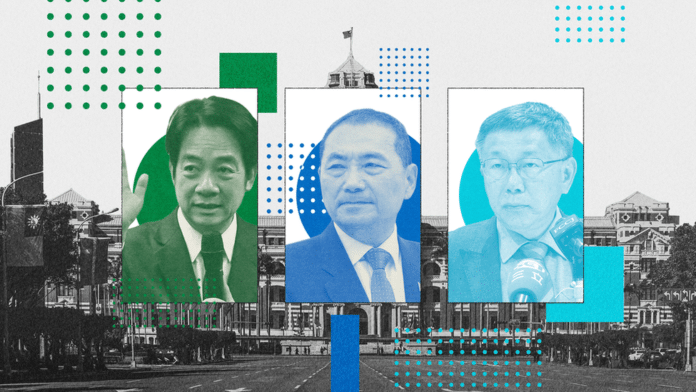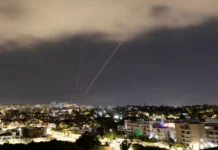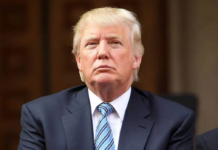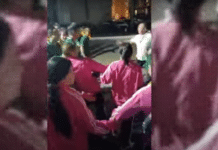But no solutions for working people from Taiwan’s three capitalist parties
ISA Taiwan
Taiwan’s presidential election on January 13 saw the victory of the incumbent Democratic Progressive Party (DPP), but they also lost their majority in Taiwan’s parliament (Legislative Yuan). Their candidate, Lai Ching-te, gathered 5.58 million votes, but this was 2.6 million fewer than the DPP’s outgoing Taiwanese president, Tsai Ing-wen, received in the 2020 election. The party of the ex-Nationalist dictatorship, the Kuomintang (KMT) received 4.67 million votes with candidate Hou Yu-ih, also 850,000 fewer votes than the previous election cycle. A relatively new third-party, the Taiwan People’s Party (TPP) and their candidate Ko Wen-je, received 3.69 million votes and increased their seats in parliament from 5 to 8. With the DPP and KMT each having 51 and 52 seats, the TPP hold a decisive minority that can tip the balance in parliament. But in reality, all three capitalist parties in Taiwan serve US imperialism.
There is no doubt that an important factor for the DPP’s victory is a mood of resisting China and seeking closer ties to the US. With the outbreak of war in Ukraine and Nancy Pelosi’s visit to Taiwan in 2022 which inflamed Chinese nationalism, Taiwanese people increasingly fear a future military attack by the CCP. The DPP is thus seen as the party which best maintains the support of the United States to “protect” Taiwan.
No matter which of the three major capitalist political parties is elected, Taiwan’s entire ruling class will not shift from its fundamental alignment with US imperialism. Even the KMT has been forced to abandon its previous CCP-friendly position, reflecting the new reality on the island as a result of the hardening New Cold War. The pro-DPP coalition (pan-greens) loudly proclaims the need to strengthen the “defence” of Taiwan, while the pro-KMT coalition (pan-blues) talks vaguely about “cross-Strait” (with China) peace. Nevertheless, both are servants of US imperialism. Neither party have a genuine strategy to resist the CCP’s aggression or an anti-war programme for the working class.
While the KMT has closely re-aligned with US imperialism, it still cannot shake off its pro-China image. This is because their main support base is pro-China Taiwanese businessmen and veteran politicians with close ties to the CCP. In an interview with Deutsche Welle on January 8 with elections merely a week away, former KMT president Ma Ying-jeou said that “Xi Jinping must be trusted in cross-Strait relations” and “Taiwan cannot defeat China.” This was catastrophic for the KMT’s campaign. In a desperate damage control exercise, the KMT candidate Hou tried to distance himself from Ma, declaring that “no unification talks” with China would take place if he was elected.
On the other hand, support for the pro-DPP coalition’s Taiwanese nationalism is flagging. The slogans “resist China and safeguard Taiwan” along with “defend democracy” proclaimed by the DPP four years ago have largely been exposed as nothing more than covers for promoting militarization and subordination to US imperialism. There is a growing backlash in public opinion against Taiwanese nationalism. Especially since the forcing through of a policy extending military service two years ago and the authoritarian wartime media control of the “All-out Defense Mobilization Readiness Act” which failed to pass. Many young people have now become disgusted with the DPP’s Taiwanese nationalism which is used to capture votes while breaking all promises to improve conditions for the masses.
For most Taiwanese workers and youth, the core election issues were a slew of social crises such as low wages, high housing prices, inflation and the shortage of goods, all presided over by the Tsai Ing-wen administration. These were the main reason why the DPP lost votes. The KMT and TPP opposition have been able to use the cost of living crisis to attack the DPP, launching campaigns for “housing justice” and “anti-corruption” in an attempt to harvest the dissatisfaction amongst the masses. However, this pivot by what are obviously parties of big business is also seen as mostly opportunistic. In the long run, these parties would not be able to form a solid electoral base with these issues.
The Taiwan People’s Party presented itself as a third-party alternative to the traditional KMT-DPP two-party system. Running on the slogan “Reject Blue and Green”, Ko Wen-je portrayed himself as a capable elite technocrat, attracting a layer of support from young people who are sick of the incompetence of establishment politicians. Ultimately, the TPP presents no solutions to Taiwan’s cost of living crises, merely “better” administration.
Ko Wen-je’s stance on China has been a zigzag. He once stated that the “Two sides of the Taiwan Strait are one family”, winning support by appearing more genuine compared to the cynical exploitation of cross-Strait tensions by the DPP and KMT every election cycle. Yet recently, he has u-turned by openly saying the TPP would continue the hardline pro-US foreign policy of Tsai Ing-wen if elected. In the end, the TPP has not been able to consolidate a solid base and present a clear programme, merely living off discontent with the two main parties. Ko’s momentum is likely short-lived and will taper off after the election.
With the election results, theoretically the KMT and TPP can block government policies if they form a bloc with each other. But Taiwan’s ruling class is united in their geopolitical orientation towards the US. Most likely, the DPP will not be paralyzed. While the opposition might portray a fig-leaf against the pro-US policies, behind the scenes it is likely they will not resist and rather horse-trade for political leverage.
Mainstream KMT politicians are increasingly distancing themselves from the CCP as the New Cold War heats up. During the election, while KMT politicians criticized the DPP for provocations on cross-Strait issues, they generally supported strengthening military rearmament and a closer alliance with the West. This hypocrisy is like when US imperialism decisively backs Israel’s war on Gaza but says it should be conducted more “humanely”.
As the New Cold War becomes increasingly tense, Taiwan’s capitalist crisis will deepen and so will working class resistance. A sharpening of the class struggle will inevitably lead to the DPP relying more upon executive rule to weaken opposition in parliament. Such an erosion of bourgeois democracy can already be seen by the government’s efforts to suppress the right to protest and strike under the banner of “national security”.
The CCP suffers another setback in the New Cold War
As we have stated before, cross-Strait tensions will not cool down no matter the party elected. The Taiwanese state’s policies are subordinated to the demands of US imperialism, which will only accelerate economic decoupling and geopolitical confrontation. Of course, the CCP cannot watch “Taiwan independence separatists” come to power and do nothing. It is forced to respond as otherwise its weakness will be exposed.
The failure of the CCP to successfully interfere in the election is a setback which drew online protests from Chinese nationalists (“little pinks”). After the election results came out, the CCP has not given a clear response. There is a deep internal crisis within the party-state with regards to handling the US-China conflict. Mistakes previously in responding to the New Cold War have cost the Chinese regime with significant economic setbacks, like the wave of trade barriers raised after the Huawei fiasco. Now, with China’s economic crisis putting the regime at a disadvantage in the New Cold War, disagreements on how to respond have bordered on paralysis. On one hand, CCP officials are afraid of being too tough and provoking a counter-reaction from the Western camp. But on the other hand, they cannot show too much weakness and undermine the regime’s nationalist authority.
Xi Jinping has recently moderated the inflammatory “Wolf Warrior” nationalist rhetoric to try and ease the conflict between China and the United States. Another expression of this is the toning down of military (often Chinese jet-fighters crossing into Taiwanese air-space) and political intimidation compared to the Taiwanese election four years ago. Of course, the CCP still attempt to interfere behind the scenes with large-scale internet disinformation campaigns against the DPP.
Last year, the CCP used pro-China billionaire Terry Gou (founder of Foxconn) to try to facilitate an electoral alliance between the KMT and TPP. But this in the end failed. To put pressure on the DPP administration, the Chinese regime terminated tariff concessions in many industries such as petrochemicals under the Cross-Strait Strait Economic Cooperation Framework Agreement (ECFA). Ultimately the burden of these rising costs will be paid by workers on both sides of the strait. None of these actions have achieved the results the CCP expected.
Mass movement
Workers have intensified their protests in Taiwan over the last year, but there is no genuine working class party to gather these forces in a political alternative. The junior coalition partners of the DPP, the New Power Party and the Taiwan Statebuilding Party, lost all seats in parliament. This not only reflects a significant fall in support for Taiwanese nationalism amongst young people, but also the dead-end of minor parties attached to the DPP. Even if they portray themselves as more “progressive” than the DPP and criticize it on isolated issues, they lack real independence from the capitalists and always align on major issues surrounding foreign policy and “national security”.
In the past, small pro-DPP parties and NGO organizations have dominated mass movements. This was a severe barrier to mass struggle as they were co-opted into merely voting for a pro-DPP and thus pro-capitalist electoral party. A significant “national unity” pressure has also hampered any modicum of opposition to the DPP, paralyzing existing struggles. It is urgent that the working class establishes its own political party to independently fight the rising social crises.
Like all past elections, this current election saw that the masses could only choose between the parties of the ruling class. Therefore, no candidate provided a genuine political solution to the crisis of capitalism. Only when workers establish their own democratic and mass organizations, can they effectively unite the current struggles, escalate their actions, and provide a real political alternative. A new party of the working class must have an internationalist position, with absolutely no trust in either Chinese or US imperialism. Further, to be truly independent of the Taiwanese bourgeoisie, a workers’ party must also adopt an anti-capitalist, socialist programme.




